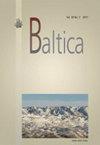宇宙核素暴露定年的误差选择——一种优化方法
IF 0.6
4区 地球科学
Q4 GEOLOGY
引用次数: 12
摘要
本文提出了一种在以前被更新世冰原覆盖的地区进行地球宇宙核素暴露测年(TCNED)时选取大样本的方法。我们的方法基于(1)对广泛的不稳定数据集的GIS分析,(2)对预先选择的巨石进行现场检查,以及(3)对选择用于采样的不稳定数据进行施密特锤(SH)测试。基于波兰西北部491块不规则巨石的特征、数字高程和地表地质特征,使用GIS软件对其进行筛选。次级数据集的预选误差包括135块巨石-即适当的目标现场检查。通过实地实地调查,最终选出了63块适合TCNED取样的巨石。这些不均匀分布位于萨利安冰期(海洋同位素阶段6)形成的冰碛高原和丘陵,以及魏希塞利冰期(海洋同位素阶段2)的Leszno/Brandenburg、poznaz /Frankfurt和波美拉尼亚期冰边缘带。基于GIS的不均匀分布特性分析使初始数据集减少了73%,这表明了这种选择技术的附加价值。对预选的巨石进行现场检查后,适合TCNED的巨石数量减少了53%。样品的SH测试提供了其表面硬度的定量代理。这样就可以量化它们的风化程度,并确定可能受冰川后侵蚀影响的不稳定因素。我们的系统方法可以为其他研究人员在大陆更新世冰期地区为TCNED选择合适的不稳定值提供有用的工具。本文章由计算机程序翻译,如有差异,请以英文原文为准。
Erratics selection for cosmogenic nuclide exposure dating – an optimization approach
The paper presents a method for the selection of large erratics to be sampled for terrestrial cosmogenic nuclide exposure dating (TCNED) in areas previously covered by Pleistocene ice sheets. Our approach is based on (1) a GIS analysis of an extensive dataset of erratics, (2) field inspection of pre-selected boulders and (3) Schmidt hammer (SH) testing of erratics selected for sampling. An initial database of 491 erratic boulders in NW Poland was filtered using a GIS software, based on their characteristics, digital elevation and surface geology. The secondary data set of pre-selected erratics consisted of 135 boulders – i.e. proper targets for field inspection. Ground-truthing in the field resulted in the final selection of 63 boulders suitable for sampling for TCNED. These erratics are located on moraine plateaux and hills formed during the Saalian glaciation (Marine Isotope Stage 6) as well as Leszno/Brandenburg, Poznań/Frankfurt and Pomeranian Phase ice marginal belts from the Weichselian glaciation (Marine Isotope Stage 2). The GIS desk-based analysis of erratics properties resulted in a 73% reduction of the initial dataset, which demonstrates the added value of this selection technique. The field inspection of pre-selected boulders resulted in a 53% reduction of the number of boulders suitable for TCNED. SH testing of the sampled erratics provided a quantitative proxy of their surface hardness. This allowed the quantification of their weathering degree and identification of erratics potentially affected by postglacial erosion. Our systematic approach to selecting erratics and their SH testing could be a useful tool for other researchers facing the problem of choosing appropriate erratics for TCNED in areas of continental Pleistocene glaciations.
求助全文
通过发布文献求助,成功后即可免费获取论文全文。
去求助
来源期刊

Baltica
地学-地质学
CiteScore
1.30
自引率
14.30%
发文量
6
审稿时长
>12 weeks
期刊介绍:
BALTICA is an international periodical journal on Earth sciences devoted to the Baltic countries region and the Baltic Sea problems. This edition as a Yearbook is established in 1961 by initiative of Academician Vytautas Gudelis. Since 1993, an Editor-in-Chief of the journal became Academician Algimantas Grigelis. BALTICA is published biannually (in June and December) in cooperation with geoscientists of the circum-Baltic States.
BALTICA is publishing original peer-reviewed papers of international interests on various Earth sciences issues. The particular emphasis is given to Quaternary geology, climate changes and development of ecosystems, palaeogeography, environmental geology, as well as stratigraphy, tectonics, sedimentology and surface processes with relevance to the geological history of the Baltic Sea and land areas. Journal emphasizes modern techniques, methodology and standards. The journal structure comprises original articles, short reviews, information, bibliography.
 求助内容:
求助内容: 应助结果提醒方式:
应助结果提醒方式:


